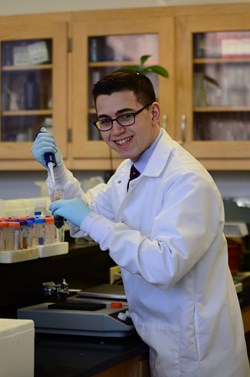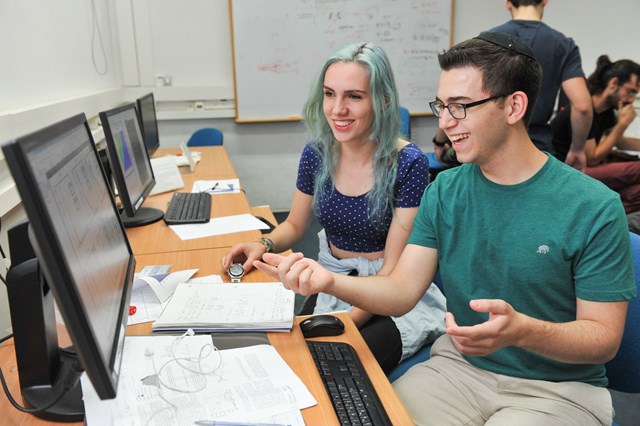For most of his life, Joshua Meier has been the textbook definition of a whiz kid. At four, he received his first computer game – a gift that fascinated him until he realized that the experience it created was “fundamentally limited.” Eager to push beyond those limitations, he opened his first email account when he was five and began programming at the age of eight.
His interests soon expanded to biology. By the time he was a high school junior in Teaneck, New Jersey, he was the head of a biotechnology company, Provita Pharmaceuticals, and had already gained recognition from Google for his stem cell research.
“What I love about science is the ability to make something,” said Meier, now a junior majoring in chemistry and computer science at Harvard. “It’s the act of creation.”
Two years ago, Meier brought his desire to create and his insatiable curiosity to the Weizmann Institute as part of the Dr. Bessie F. Lawrence International Summer Science Institute (ISSI). For one month, he joined a delegation of 20 American teens – and some 60 others from around the world – to work in the labs of the Institute alongside renowned Weizmann scientists.

The experience had a strong impact on Meier, who won a scholarship to the ISSI program after competing in the Intel International Science and Engineering Fair (ISEF). “I saw ISSI as an opportunity to interact with people from across the globe,” he recalled. “It was also a chance to study a new field.”
Working in one of the Institute’s cutting-edge stem cell laboratories would have been a natural fit, but Meier decided to expand his horizons. He spent his four weeks at the Institute in the lab of Prof. Eilam Gross in the Department of Particle Physics and Astrophysics, under the guidance of PhD student Michael Pitt. “These scientists are studying the fundamental units of nature,” he explained. “They’re trying to understand the universe.”
While immersing himself in a new area of scientific research, Meier gained an appreciation for the collaborative environment at Weizmann. He had the opportunity to observe the exchange of ideas between labs at the Institute, and between international research teams. One of his favorite memories of his time on campus was sitting in on a meeting of physicists from all over the world who convened through a video chat system.
Beyond the lab, Meier’s greatest takeaways from the program were the friendships he made. “ISSI taught me that science is more than data; it’s people,” he said. The strong sense of community and international setting allowed him to “see the story of science through different people’s eyes.” As a frequent traveler to Israel, where his grandmother lives, he also loved watching his new friends experience the country for the first time: “On weekends, we’d go to Tel Aviv. It was cool to see people get excited about Israel and to introduce them to my culture.”

Joshua Meier at the Weizmann Institute with his ISSI lab partner, Sietske Lensen from the Netherlands.
Today, the ISSI community remains an important part of Meier’s life. He keeps in contact with fellow participants through Facebook, where, he says, “We’re in touch regularly.” He’s also collaborating on a startup with fellow ISSI alum and Harvard student, Samuel Liu. While the project is still in “stealth mode,” it involves integrating machine learning – human-assisted AI, specifically – with customer service. Given the “heavy technology” required, he views this as a long-term project; he feels encouraged by the early support he and Liu have received from the Harvard Innovation Lab.
ISSI taught me that science is more than data. It's people.
Although he’s just 20 years old, this isn’t Meier’s first go-round as a tech entrepreneur. Recently, he gained significant attention for an app he developed called TaxiLater, which allows riders to schedule an Uber ahead of time. The idea came to him while he was interning at Square in San Francisco and frequently took the on-demand car service to work. Despite TaxiLater’s success, he says the app is just one of many “backburner projects.”
Given his multitude of interests and boundless energy, it would seem that Meier’s biggest challenge will be deciding which direction to take his scientific pursuits. Asked what the future holds, he responded, “Science is always changing, so it’s important to stay flexible.” While he hopes to remain active in a number of disciplines, his ultimate goal is “to work on projects that make people’s lives better and easier” – whether this means helping create lifesaving medical technology in the lab or making society more efficient as a high-tech entrepreneur.
Wherever his aspirations take him, he will continue to look back fondly on his summer at the Weizmann Institute. “It was an incredible opportunity that changed the way I think about the world,” he said. “I became a better scientist.” He now enjoys keeping up with the accomplishments of his fellow ISSI alums, all of whom are succeeding in their scientific journeys. “Science is always interesting when it’s a story,” he commented. While he may not know how his own story will unfold, he will undoubtedly chase the same dreams he’s had from the beginning – when he was just a kid who wanted to make something.
